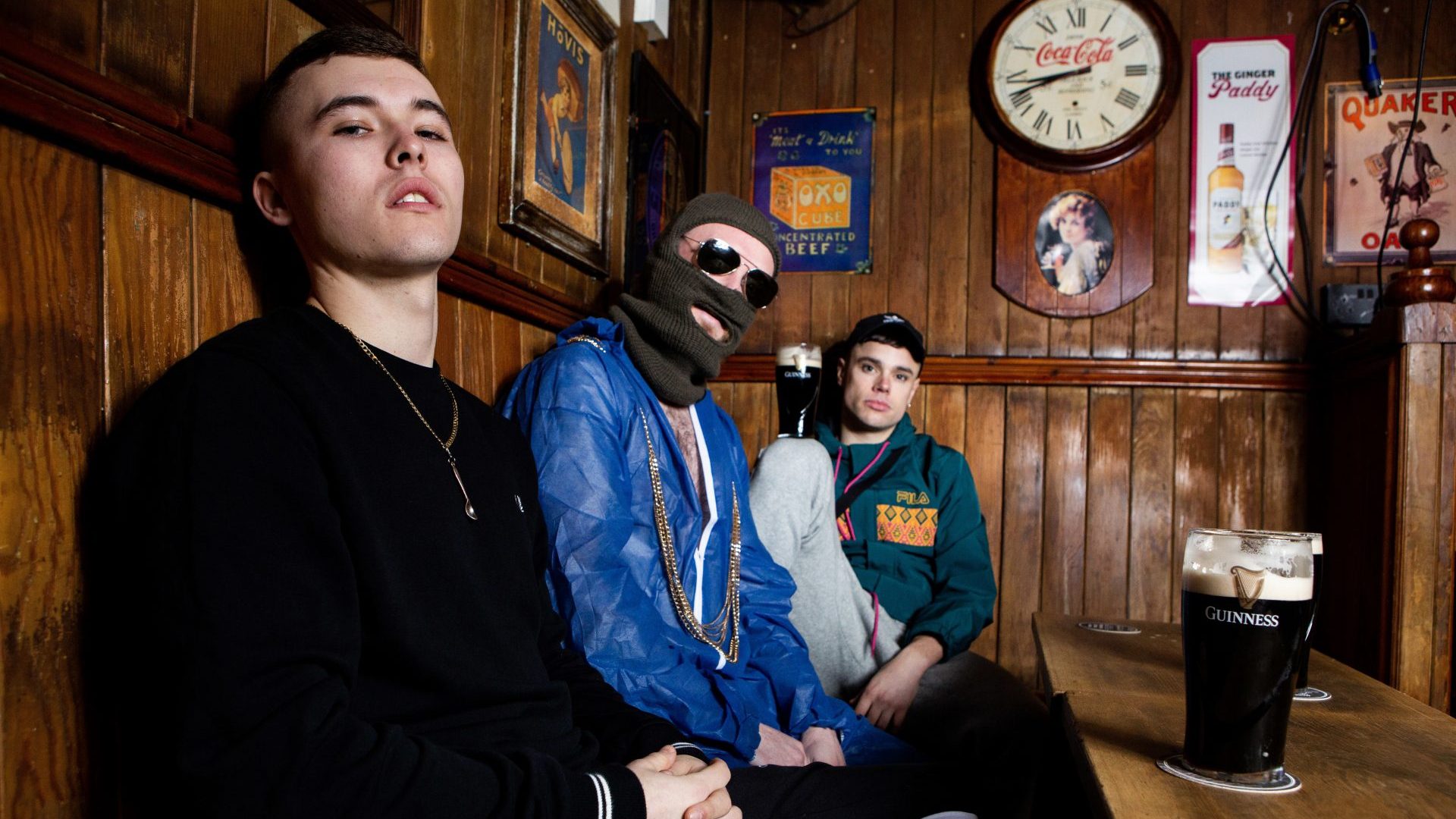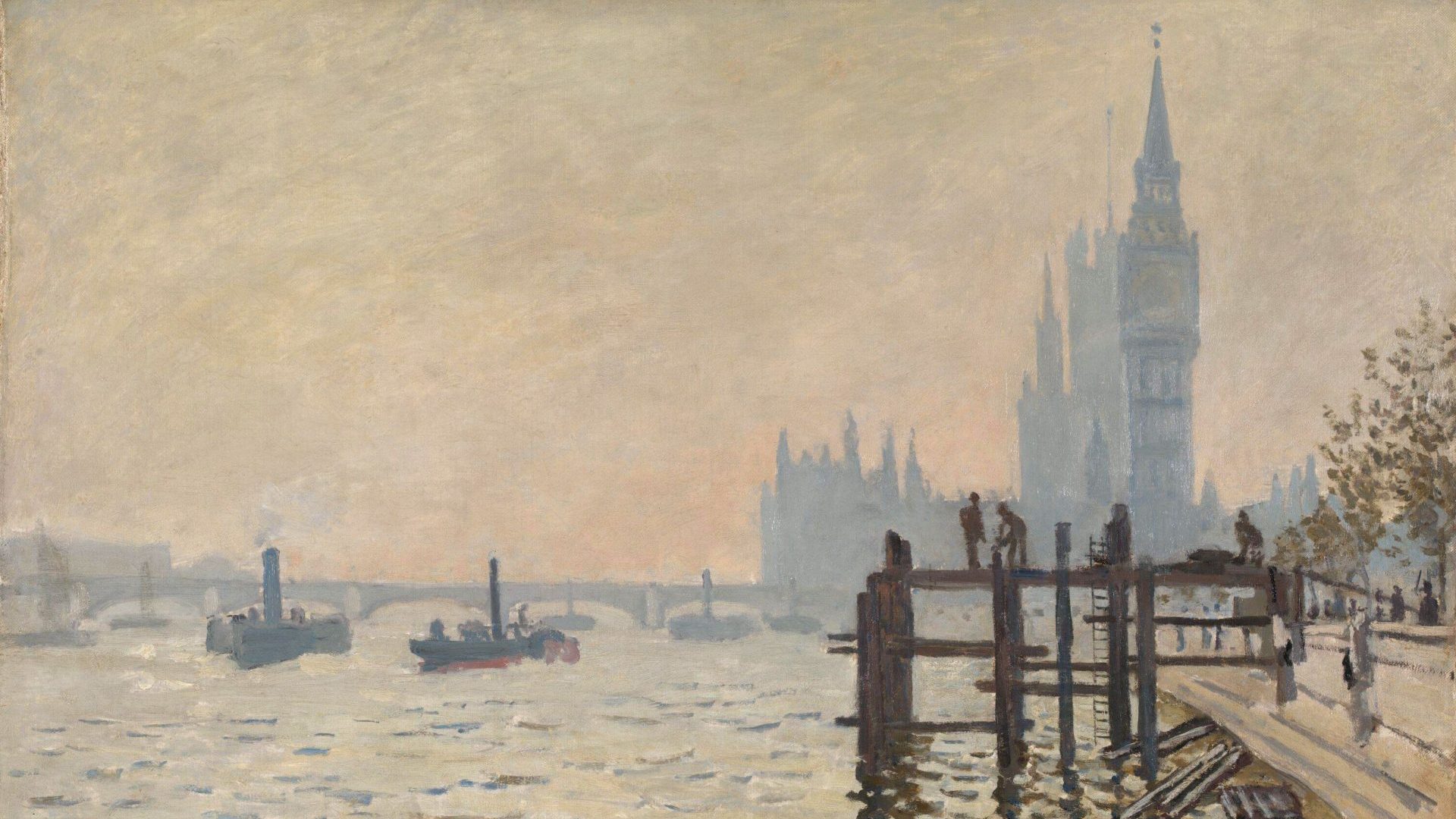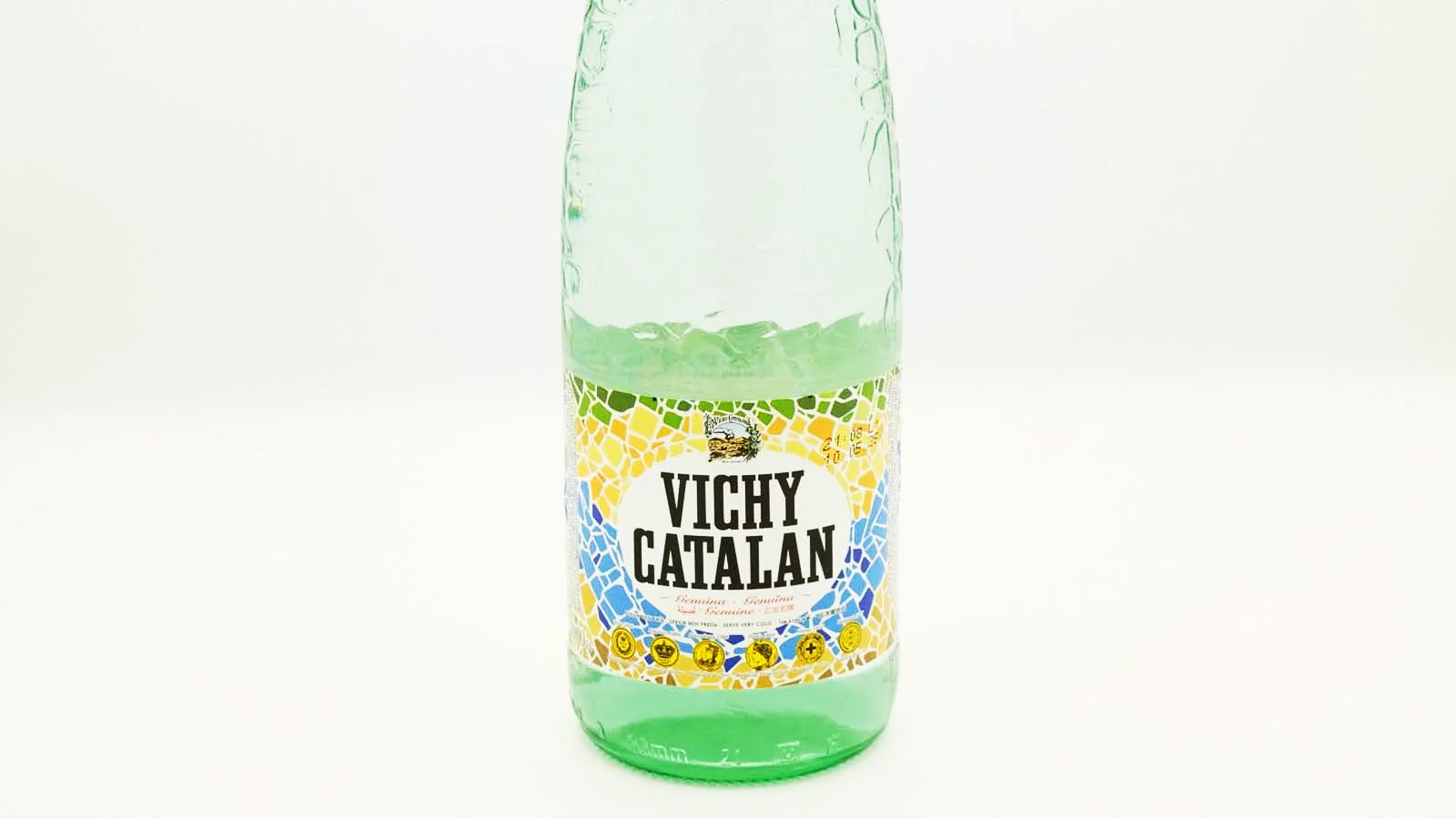Flying west from the Republic of Ireland, the members of Kneecap have discovered they can clear US customs and immigration before boarding their plane. Flush with the success of their eponymous film, which was released to wild acclaim in August, the hip hop trio from west Belfast have been shuttling across to the New World so often they’re now on first-name terms with some of the guys checking their passports and visas.
They’re summoned to the front of the queue and asked how they’re getting on. “Saw the film,” the officials say, apparently untroubled by its representations of the kind of recreational drug use that would put the Grateful Dead to shame. To the sound of congratulations, their luggage unmolested, they’re then sent on their way.
“Aye, but… usually in America [itself] they’re a lot more hostile,” reports DJ Próvaí, the former schoolteacher now responsible for the beats upon which bandmates Mo Chara and Móglaí Bap lay their bilingual (Irish and English) rhymes. “But we haven’t had our bags searched thoroughly yet, luckily, because sometimes you forget that things are in your pocket before you get to the next city. You only find out whenever you land that something has been travelling with you that shouldn’t have been travelling with you.”
Despite his face being on display in Kneecap’s only partially fictionalised account of its subject’s ascent to prominence, today, DJ Próvaí is sporting his onstage disguise of a balaclava knitted in the green, white and orange of the Irish tricolour. As if suddenly mindful that his talk of unwittingly ferrying contraband across state lines will appear in black and white, he stops and asks: “Listen, where’s this getting printed?”
This ceasefire in his mile-a-minute patter is only temporary, though; caution, it seems, is not a defining characteristic. The sheer gusto with which Kneecap speak their mind – on politics, drugs, Irish history, you name it – is either evidence of artists who have yet to acclimatise to the kind of elevated status in which people take care when speaking to journalists, or else a band who don’t give a damn.
As sponsors of a gymnasium and community centre in the Aida refugee camp, in the occupied West Bank, DJ Próvaí uses the word “genocide” to describe the nature of Israel’s military campaign over the past 13 months.
Elsewhere, on the domestic front, his group’s noisy insistence on fighting their corner has led to outcry from predictable quarters. Spooked at the prospect of a forthcoming gig in Derry, Democratic Unionist Party Assembly member Gary Middleton even turned his hand to music criticism. “I believe [Kneecap] thrive on controversy rather than talent,” he told BBC Radio Foyle.
“We’ve got this kind of tag [where] unionist and loyalist politicians say we’re stoking sectarian divisions,” DJ Próvaí tells me. “But if you watch the film and listen to the music – even if you don’t understand all of it, there’s translations of it everywhere online – it’s about bringing people together.”
Even in the most testing of circumstances, it can be done. In the late 1970s, the determination of the Undertones – the group with which this edition’s guest editor, Feargal Sharkey, made his name – to sing about things other than the turmoil pockmarking their city streets proved that the kids on the Bogside, in Derry, wanted their teenage kicks just like the young people in Basildon and Barnsley. They wanted to rock and roll.
In gravely troubled times, the band even persuaded the Clash and the Damned to cross the Irish Sea for a gig that was cancelled only after Joe Strummer received letters from paramilitaries threatening his life were he to enter the city. The Undertones doubted the danger was real, but as guitarist Damian O’Neill told me, in 2022, “We couldn’t really persuade him that it was probably bollocks – you know, we couldn’t tell him that”.
“We’re big fans of Feargal and the Undertones,” DJ Próvaí says. “We take inspiration from that whole punk scene that happened.” As an independent group with opaque rules of engagement, this is surely true. It took weeks to set up the interview for this article. I’ve spoken with bands aboard private jets with less bother.
They’ve nailed punk rock’s confrontational aspect, too. In an age when music makers tend toward the insular, even to the solipsistic, Kneecap’s deft ability to use humour and originality as a means of getting up people’s noses is a trait not really seen since the days of Chumbawamba.
When it comes to fighting the power, you can stand them up at the gates of hell but they won’t back down. If a venue asks for a cut of their merchandise revenue (a standard practice in larger rooms) the group will simply set up a stall on the street outside. From the stage, they’ll call out the policy as the work of “stingy bastards” and crooks. “That puts them in their place,” DJ Próvaí says.
They certainly have no problem being political. Released in 2017, the group’s debut single, C.E.A.R.T.A, was in part inspired by a friend who insisted on speaking Irish, rather than English, following a pull by the Police Service of Northern Ireland. “Young man we caught you damaging public property and you are coming down to the station so we can talk properly,” they sing.
In a fictionalised retelling of the incident in their film, this impasse is the catalyst that propels the group into existence. A second meeting between DJ Próvaí and his soon-to-be bandmates comes as a result of a confrontation with an Orange Order marching band. Never mind that Kneecap are children of the Peace Process, onscreen, the ghosts of war have speaking parts.
“The funny thing is, back in the day, were you to have walked down a street [representing] one side of the community in a Rangers or Celtic shirt, you could have been shot dead,” Próvaí tells me. “But that’s just not the case any more.
“The younger generation, thank God, are a lot more open with each other. They can have craic, they can slag each other off about sectarianism, and it’s not going to lead to bad violence. We’ve reached that point now.”
Later in our interview, he adds, “Nobody has that connection to religion any more. People don’t give a fuck. Nobody goes to mass; nobody goes to church.”
In making people laugh about matters that have defined a region for more than a century now, with remarkable dexterity, Kneecap have dodged the elephant traps into which message-based art can often tumble. Neither hectoring nor earnest, their film is the funniest I’ve seen this year; as well as this, its themes have stayed with me weeks after I took myself off to the pictures to watch it.
Attempting to decode what is and isn’t directly autobiographical provides an element of mystery that is always useful to people who make music. DJ Próvaí is rather more serious than the 30-something dreamer led astray by the powerful gravity of his younger bandmates viewers see on screen. When discussing the mental health condition Post-Colonial Stress Disorder, a topic framed as comedy with a serious point in the movie, the laughs are absent.
“Four thousand people died during the conflict [the Troubles] through violence, and now, after the 1998 ceasefire, more people have died from suicide than during the whole conflict,” he reports. “And that’s not something that’s being spoken about. The fact that we have peace, a physical peace, doesn’t represent the internal strife people are feeling in a post-conflict society. The mental health [struggles] gets passed on to the next generation.”
He goes on. “But we’ve had the space between it,” he says. “We’re the barrier between that time and our time. We come from a humorous society, people have this dark humour anyway, where they find a way to laugh about it and make peace. [On] the new album” – Fine Art, the group’s second, was released in the summer – “there’s a lot of talking about the mental health crisis and people not dealing with it in a proper way. So for us, we’re trying to open up a discussion where people can speak about these things in an open manner and not just hide it away as the generation before did. If you do that, it explodes in suicide, unfortunately.”
In Kneecap’s telling, you see, the issue in the Six Counties is a universal matter: it isn’t about two “communities” so much as one class.
Conveying an underlying fear of the other and a whiff of unease about uppity antagonists not knowing their place, to my untrained ear, it’s why the charges of incitement laid at their door by shrill politicians from across the religious divide sound dated and hollow. It’s why they’re not landing.
The band have no desire to order the streets along yesterday’s lines; they don’t want anyone to be excluded. For all their frolicking fury, at their core, Kneecap believe in utopianism. Never mind Catholics or Protestants, it’s the higher-ups who are standing in the way.
“The government created sectarianism, the people didn’t create it, and we have to remember that,” DJ Próvaí says. “It’s time for an alternative. That alternative will not be ousting people from the country that all their ancestors grew up in. People have been planted here 600 years ago from Scotland and England – they have as much right to live here now [as anyone]. Generations of their family are here.
“So it’s not about getting people out, it’s about bringing people together in a better society. But we want to keep the NHS, of course, and the free bins.”
Or to put it another way, in the words of Spinal Tap drummer Mick Shrimpton, why not have a good time all of the time? Certainly, if one is to believe the essence of the story that unfolds in their movie, the pursuit of happiness by any means necessary is no small motivation for DJ Próvaí, Mo Chara and Móglaí Bap.
As the time ticks down on our interview, after only a short pause, the man in the tricolour balaclava answers my question as to whether Kneecap themselves take as many drugs as their cinematic equivalents with a simple “aye”. But in learning to mitigate the effects of a post-show pick-me-up while out on the tiles in the tiny hours of night, Próvaí adds the kind of caveat that makes even the post Good Friday Agreement friendship between Martin McGuinness and the Reverend Ian Paisley pale by comparison.
“We’re getting up in the morning and going to the gym, or maybe going for a swim if there’s a spa in the hotel,” he tells me. “We just get up and do stuff to keep our heads right because you can be caught in a mad bubble when you’re on tour.
“But it’s brilliant. We get to see all around the world with our friends, doing something we love, spreading the Irish language and bringing people together. It’s hard not to enjoy.”
Ian Winwood is author of the best-seller Bodies: Life & Death in Music, published by Faber



